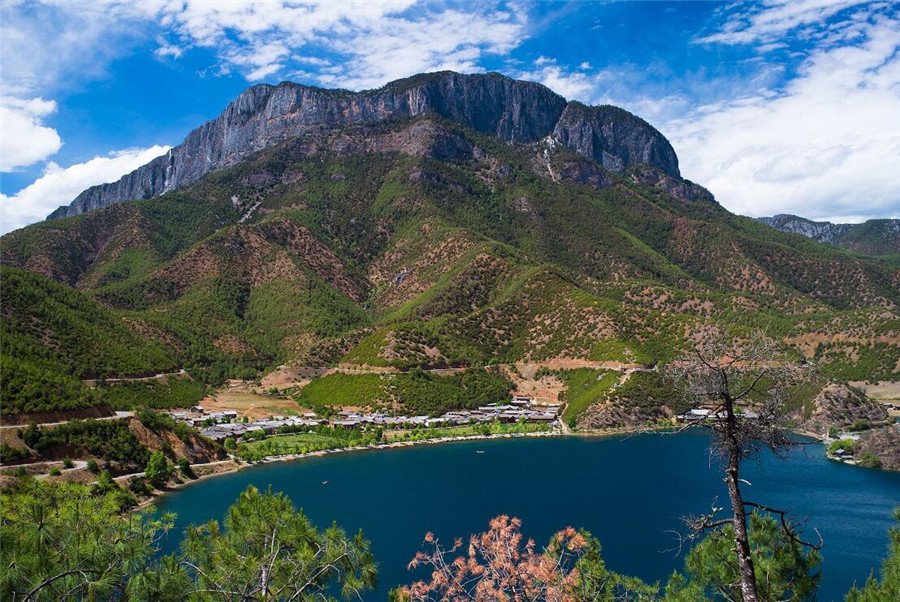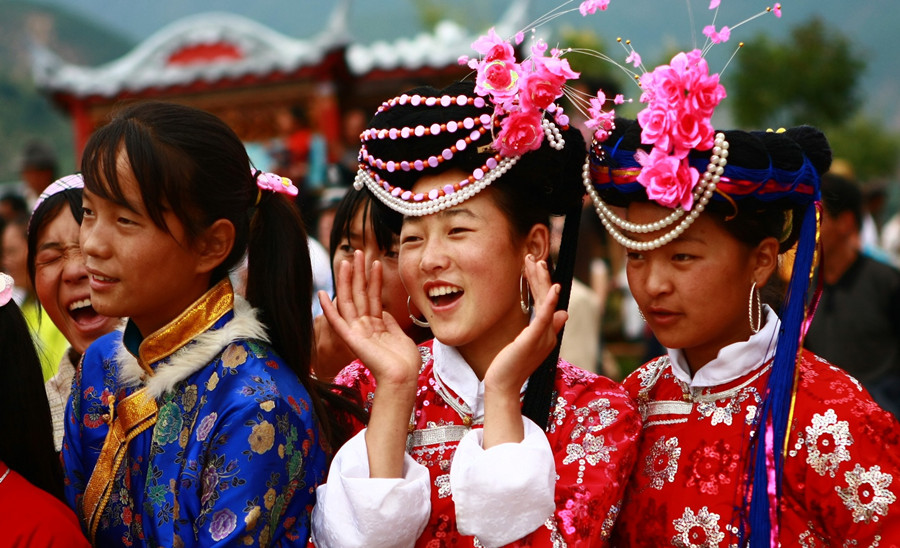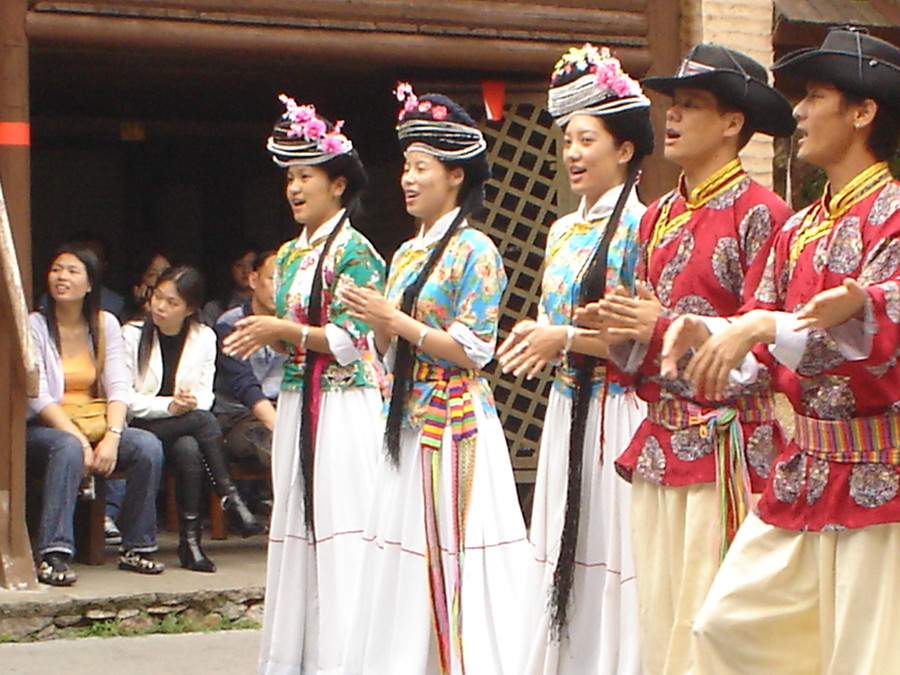Gemu Mountain Pilgrimage Festival of Mosuo Ethnic People in Lugu Lake, Lijiang
The Mosuo People’s Mountain Worship Festival (摩梭人转山节), also known as the Mountain Pilgrimage Festival, is an important traditional celebration for the Mosuo people (摩梭族) of Yongning Town (永宁镇), Ninglang County (宁蒗县), Lijiang (丽江), Yunnan Province. The festival is celebrated annually on the 25th day of the 7th lunar month and is focused around the worship of Gemu Goddess Mountain (格姆女神山). It includes religious rituals such as pilgrimages, prayers, and traditional performances, highlighting the Mosuo people’s unique religious customs and cultural heritage.
Festival Overview
Location
Main Venue: Gemu Goddess Mountain (格姆女神山), Lugu Lake (泸沽湖), Yongning Town (永宁镇), Ninglang County (宁蒗县), Lijiang (丽江), Yunnan Province (云南省).
Key Dates
Festival Date: 25th day of the 7th lunar month (For 2025, the date falls on September 7th).
Official Holiday: Since 2018, the festival has been declared a local public holiday in Ninglang County (宁蒗县), with three days off from September 7th.
Festival Origins and Significance
Origins
The Mountain Worship Festival originates from the Mosuo people’s dual reverence for nature and motherhood. The festival is centered on the worship of Gemu Goddess Mountain (格姆女神山), also known as Lion Mountain (狮子山), the highest peak in Yongning (永宁), with an elevation close to 4,000 meters. According to the legend, the Gemu Goddess was originally a skilled weaver from the village of Yongning (永宁), who, after being transformed by the sky gods, became a guardian deity protecting the prosperity and well-being of the Mosuo people.
Religious and Cultural Significance
The festival celebrates the Mosuo people’s enduring belief in the Gemu Goddess (格姆女神), who is believed to protect the region, ensuring abundant harvests, healthy livestock, and the overall prosperity of the community.
Core Rituals and Activities
Pilgrimage and Worship
On the 25th day of the 7th lunar month, Mosuo men and women, dressed in traditional attire, embark on a pilgrimage to Gemu Goddess Mountain (格姆女神山), either by foot or on horseback. Along the way, they hang prayer flags (经幡) and offer sacrifices such as butter, milk curds, and other traditional offerings. Daba priests (达巴), who serve as spiritual leaders, lead the prayers for prosperity and protection.
Traditional Celebrations and Competitions
Lion Dance (狮子舞): A national intangible cultural heritage dance where participants gather around a bonfire and join hands to form a circle, dancing to traditional music. Visitors are welcome to join the celebrations.
Horse Racing and Wrestling (赛马与摔跤): These competitions display the bravery and strength of Mosuo men.
Picnic Gatherings (野餐聚会): Families set up tents and share traditional foods, including pork belly (猪膘肉) and Suli Ma wine (苏里玛酒), with the men preparing the meals and women enjoying leisure activities.
Modern Additions (2025)
Women’s Walking Competition: A special event taking place along the sacred Gemu Goddess Mountain (格姆女神山) route.
Cultural Forum: A discussion focused on the preservation of Mosuo culture and the integration of tourism and local traditions.
Cultural Meaning and Heritage Preservation
Natural Worship
The Gemu Goddess (格姆女神) is revered as the protector of Lugu Lake (泸沽湖), and the festival continues a millennia-old tradition of honoring the goddess for her blessings upon the land, livestock, and people.
Intangible Cultural Heritage
The Mountain Worship Festival was included in the Yunnan Province Intangible Cultural Heritage List in 2007 and is recognized as a key cultural event that promotes the preservation of Mosuo customs and traditions. In 2018, it was officially designated a local public holiday in Ninglang County (宁蒗县).
Travel Tips
Best Time to Visit
Festival Dates: 25th day of the 7th lunar month (For 2025, the festival will be held on September 7th).
Main Festival Venue: Yongning Town (永宁镇), Ninglang County (宁蒗县), Lijiang (丽江), Yunnan Province (云南省).
Things to Keep in Mind
The pilgrimage requires participants to walk in a clockwise direction around Gemu Goddess Mountain (格姆女神山).
Visitors should be respectful of the sacred rituals and avoid touching the offerings or disrupting religious ceremonies. Permission is required before photographing religious events.
The Legend of Gemu Goddess Mountain
The Gemu Goddess Mountain (格姆女神山) is said to resemble a reclining lion, standing majestically between Lugu Lake (泸沽湖) and Yongning (永宁). The legend tells the story of a beautiful, intelligent, and hardworking girl from Yongning (永宁), who was transformed into the Gemu Goddess. She became the guardian of the region, watching over the people and ensuring their prosperity, health, and well-being.
Every year, on the 25th of the 7th lunar month, the Mosuo people gather at the base of Gemu Goddess Mountain (格姆女神山) to worship and seek her blessings for a good harvest, healthy livestock, and peace in their lives.
The Transformation of the Girl
The story goes that one day, a sky god saw the beautiful girl and, enamored by her, whisked her away in a gust of wind. The people of Yongning (永宁) cried out, but the girl could not return to earth. Her body became one with Gemu Mountain (格姆山), and her spirit became a goddess, riding a white beast and holding a golden flute, forever guarding the region.
This legend is at the heart of the Mountain Worship Festival (转山节), a vibrant celebration that honors the goddess and her protection over the Mosuo people (摩梭族).
Mosuo People’s Goddess Festival (also known as Mountain Worship Festival) in Ninglang County, Lijiang
The Mosuo People’s Goddess Festival (摩梭人女神节), also referred to as the Mountain Worship Festival (转山节), is a traditional celebration of the Gemu Goddess (格姆女神) held annually on July 25th. This festival is an important cultural event for the Mosuo people (摩梭族) in Yongning Town (永宁镇), Lijiang (丽江), located near Lugu Lake (泸沽湖). The festival is centered around Gemu Goddess Mountain (格姆女神山), where the Mosuo people honor their goddess through a series of rituals, processions, and communal activities.
Festival Overview
Location
Main Venue: Gemu Goddess Mountain (格姆女神山), Lugu Lake (泸沽湖), Yongning Town (永宁镇), Ninglang County (宁蒗县), Lijiang (丽江), Yunnan Province (云南省).
Key Dates
Festival Date: July 25th, every year.
Traditional Celebrations
The Mosuo people gather at Gemu Goddess Mountain (格姆女神山) near Lugu Lake (泸沽湖) to offer prayers and offerings to the Gemu Goddess, seeking blessings for a prosperous life.
Festival Rituals and Activities
Pilgrimage and Prayers
On July 25th, men and women from the Mosuo community wear their finest traditional attire, ride horses, and travel by cart to Gemu Goddess Mountain (格姆女神山). They bring food for a picnic, and after making a circle around the mountain, they offer honey, fresh flowers, butter, and milk curds as offerings to the goddess. After the rituals, the community enjoys a shared picnic, with men cooking and women enjoying leisure activities.
Singing and Dancing
The festival reaches its peak when the youth of the village, led by the rhythmic sound of drums, engage in energetic traditional dances such as the Lion Dance (狮子舞). The men participate by dressing as women, following the customs of the festival. After the dances, a horse race (赛马) takes place, showcasing the competitive spirit of the community.
The Legend Behind the Festival
The Gemu Goddess Festival (格姆女神节) is inspired by a beautiful and poignant legend. In ancient times, a beautiful, intelligent, and kind-hearted girl lived at the foot of Gemu Mountain (格姆山). She was as beautiful as the moon in the sky and as pure as the waters of Lugu Lake (泸沽湖). Many young men were enchanted by her beauty, but the sky god, enamored by her, decided to take her to the heavens. On the 25th day of the lunar calendar, the sky god transformed into a fierce wind and swept her away. The people on earth, witnessing this, cried out, but the sky god made a mistake and let her go. However, she could not return to earth. Her body transformed into a mountain that stood tall between the heavens and the earth, and her soul became a goddess. Riding a white horse and playing a bamboo flute, she sorrowfully gazed upon her homeland, watching over the people of Lugu Lake (泸沽湖). This mountain, now known as Gemu Mountain (格姆山), symbolizes the goddess’s eternal protection of the region.
Cultural Significance
Reverence for Nature and Spirituality
The festival reflects the Mosuo people’s deep reverence for nature and their belief in the Gemu Goddess (格姆女神) as a protective spiritual figure. It highlights the intersection of Mosuo mythology, natural worship, and communal identity.
Preservation of Traditional Customs
The Goddess Festival (女神节) is a vital part of the Mosuo people’s (摩梭族) cultural heritage, linking their matrilineal traditions with the surrounding natural environment. The festival, with its combination of ritual, dance, and communal feasts, plays an important role in preserving the Mosuo people’s unique customs and way of life.
Travel Tips
Best Time to Visit
Festival Dates: July 25th, every year.
Recommended Activities: Participate in the pilgrimage (朝山), enjoy the Lion Dance, and witness the horse races (赛马) while learning about the local Mosuo culture (摩梭文化).
Things to Keep in Mind
Be respectful of the cultural and religious significance of the Gemu Goddess Festival (格姆女神节).
The Mosuo people’s (摩梭族) way of life is deeply rooted in matrilineal customs, so consider engaging in the festival with a genuine interest in learning about their traditions.
This festival offers an extraordinary opportunity to explore the cultural richness of the Mosuo people (摩梭族) and their unique spiritual connection to the beautiful Lugu Lake (泸沽湖).

 7 Days GolfingTour
7 Days GolfingTour
 8 Days Group Tour
8 Days Group Tour
 8 Days Yunnan Tour
8 Days Yunnan Tour
 7 Days Shangri La Hiking
7 Days Shangri La Hiking
 11 Days Yunnan Tour
11 Days Yunnan Tour
 6 Days Yuanyang Terraces
6 Days Yuanyang Terraces
 11 Days Yunnan Tour
11 Days Yunnan Tour
 8 Days South Yunnan
8 Days South Yunnan
 7 Days Tea Tour
7 Days Tea Tour
 8 Days Muslim Tour
8 Days Muslim Tour
 12 Days Self-Driving
12 Days Self-Driving
 4 Days Haba Climbing
4 Days Haba Climbing
 Tiger Leaping Gorge
Tiger Leaping Gorge
 Stone Forest
Stone Forest
 Yunnan-Tibet
Yunnan-Tibet
 Hani Rice Terraces
Hani Rice Terraces
 Kunming
Kunming
 Lijiang
Lijiang
 Shangri-la
Shangri-la
 Dali
Dali
 XishuangBanna
XishuangBanna
 Honghe
Honghe
 Kunming
Kunming
 Lijiang
Lijiang
 Shangri-la
Shangri-la
 Yuanyang Rice Terraces
Yuanyang Rice Terraces
 Nujiang
Nujiang
 XishuangBanna
XishuangBanna
 Spring City Golf
Spring City Golf
 Snow Mountain Golf
Snow Mountain Golf
 Stone Mountain Golf
Stone Mountain Golf












